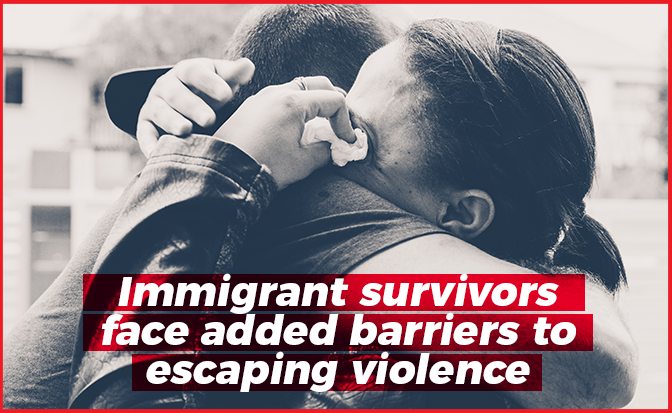Immigrant survivors face added barriers to escaping violence
Written by SAFE
When someone who has been affected by abuse tells us they’re afraid to seek help, we see that as a serious problem. As talk of deportation and family separation ramps up, situations like Isabel’s become more and more common.
Isabel has been physically and sexually abused by her husband for at least as long as she’s lived in the United States. She has legal residency here, but told one of our counselors that rumors of ICE raids has her scared to seek additional help. Isabel’s husband told her that they could take away their child because of her resident status, which isn’t true. But the truth is hard to recognize in a relationship marked by constant manipulation and violence. She refuses to enter our shelter.
Immigrant survivors of abuse already face barriers to escaping violence, especially when language barriers, isolation, immigration status, and lack of resources make it dangerous to leave.
Threats of deportation or family separation only add another barrier to reporting abuse. Abusive family members often use this threat to keep control over their partner or the rest of the family. In other words, a climate of fear in the community can reinforce a climate of fear in the home.
Even when survivors report to police or local agencies, fear of going to court can prevent them from getting the justice and safety they need. For many immigrants who have experienced abuse, seeking protection feels more dangerous than staying silent.
Research supports the claim
Recently, a national network of organizations worked together to gain a better picture of how these fears are affecting their work with survivors. According to the survey:
- 25% of advocates report that immigrant survivors have concerns about contacting police.
- 3 out of 4 advocates report that immigrant survivors have concerns about going to court for a matter related to the abuser/offender.
- 52% of advocates worked with immigrant survivors who had dropped civil or criminal cases because they were fearful to continue with their cases.
The message is clear – many immigrant survivors of abuse feel that seeking justice and protection is more dangerous than staying silent. Laws passed by congress offer protections for survivors without legal status when they report their abuse and cooperate in a criminal investigation in hopes that widespread fear of deportation will not prevent law enforcement from keeping communities safe. Despite these efforts, fear and confusion persist and abuse often remains hidden.
According to the survey, advocates noticed another change in recent years: an increase in immigration-related questions from survivors. This indicates a need for survivors to understand their rights related to their immigration status and what to do in case of a suspected raid. As one advocate put it, “If the media discusses the changes in immigration law, the calls increase.”
When immigrant survivors know their rights, perpetrators of abuse have one less tactic of fear. When survivors of abuse are safer, our whole community is safer.
You can make a difference in your community by sharing this information:
- We Have Rights includes informational videos on how to prepare for encounters with ICE (available in English, Spanish, Urdu, Arabic, Haitian Creole, Russian, and Mandarin).
- Know Your Rights Infographics from the Immigrant Defense Project (available in over 16 languages).
- SAFE offers free, confidential services to all survivors of abuse, regardless of their immigration status. If you or someone you know has experienced abuse, consider contacting our 24-hour SAFEline:
- Call: 512.267.SAFE (7233)
- Text: 737.888.7233
- Chat: safeaustin.org/chat